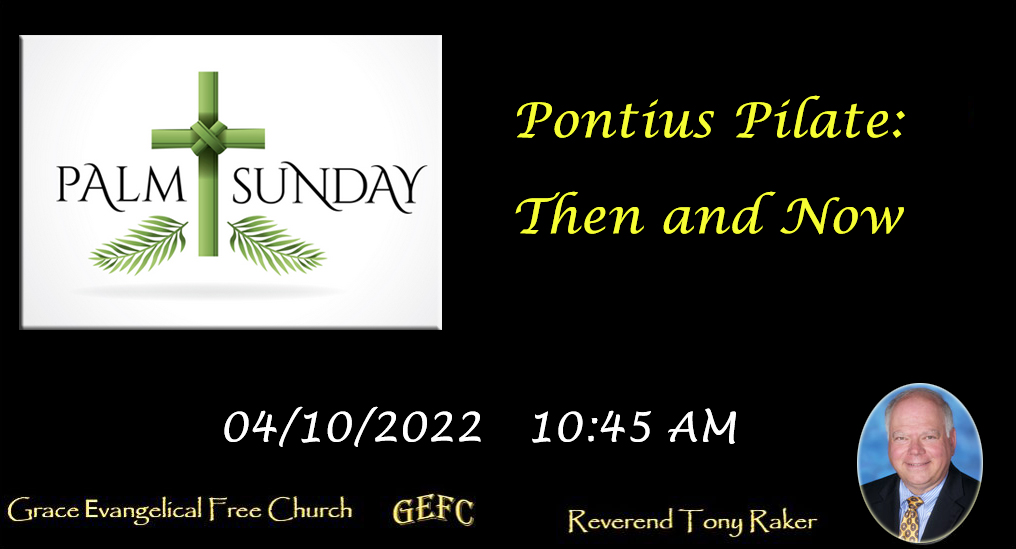All Sermons


Pontius Pilate: Then and Now
The crucifixion of Christ came at the direction of one Roman official, Pontius Pilate, whose quandary mirrors that of every person faced with the claims of Jesus.
- Contextual/Comparison: God keeps His Word. In the Bible, Pontius Pilate is mentioned solely in connection with the trials and crucifixion of Jesus; the Biblical texts underscoring his professional, governing, religious, family, constituent and personal implications of this sole encounter:
- Professional implications: “And as soon as it was morning, the chief priests held a consultation with the elders and scribes and the whole council. And they bound Jesus and led him away and delivered him over to Pilate.” (Mark 15:1-2)
- Pontius Pilate is mentioned by Tacitus, Philo, and Josephus
- The “Pilate Stone,” discovered in 1961 and dated A.D. 30, includes a description of Pontius Pilate and mentions him as “prefect” of Judea
- Pontius Pilate was the Roman governor of Judea from A.D. 26-36, serving under Emperor Tiberius, tasked with keeping the peace
- Governing implications: “And Pilate asked him, “Are you the King of the Jews?” And he answered him, “You have said so.” 3 And the chief priests accused him of many things. 4 And Pilate again asked him, “Have you no answer to make? See how many charges they bring against you.” 5 But Jesus made no further answer, so that Pilate was amazed” (Mark 15:3-5).
- Any challenge to Roman authority was a challenge of the Emperor
- Pilate calls the charges against Jesus “baseless” (Luke 23:14) and several times declares Jesus to be not guilty: “What crime has this man committed? I have found in him no grounds for the death penalty” (Luke 23:22)
- Religious implications: “Now at the feast he used to release for them one prisoner for whom they asked. 7 And among the rebels in prison, who had committed murder in the insurrection, there was a man called Barabbas. 8 And the crowd came up and began to ask Pilate to do as he usually did for them. 9 And he answered them, saying, “Do you want me to release for you the King of the Jews?” 10 For he perceived that it was out of envy that the chief priests had delivered him up. 11 But the chief priests stirred up the crowd to have him release for them Barabbas instead” (Mark 15:6-11)
- Jesus had been handed over by the religious leaders out of envy
- The religious leaders convinced the crowd to cry out for Barabbas (Matthew 27:20–21)
- Family implications: “…while he was sitting on the judgment seat, his wife sent word to him, “Have nothing to do with that righteous man, for I have suffered much because of him today in a dream” (Matthew 27:19)
- Pilate’s conscience was already bothering him when his wife sent him an urgent message concerning Jesus
- Matthew gives the impression that Pilate just sat there, transfixed
- Constituent implications: “Wanting to satisfy the crowd, Pilate released Barabbas to them. He had Jesus flogged, and handed him over to be crucified” (Mark 15:15)
- Putting the gospel accounts together, Pilate tried four times to avoid sentencing Jesus to death. First, he told the Jews to try the case themselves. Second, he sent the case to Herod. Third, he tried to placate the Jews by scourging Jesus instead of crucifying him. Fourth, he tried to make a deal but the people chose Barabbas instead
- Pilate tries to evade responsibility: “So when Pilate saw that he was gaining nothing, but rather that a riot was beginning, he took water and washed his hands before the crowd, saying, “I am innocent of this man’s blood; see to it yourselves” (Matthew 27:24)
- Personal implications:
John 18:37c, 38 – “Everyone who is of the truth listens to my voice.” 38 Pilate said to him, “What is truth?”
- Grammatical Usage: “truth” or in the Greek, “alētheias” meaning, “reality” as opposed to illusion; context referring to Jesus’ divine nature.
- Literal Interpretation: Everyone who is of the reality of God listens to my voice. Pilate said to him, “What is this reality?”
- Pilate was neither in jest nor scoffing
- Jesus, even at this moment, was preaching to Pilate
- Pilate, clearly mystified, was asking for more
- Weighing the evidence and his wife’s plea, he is convinced to a point
- Pilate rushes to stem the public fervor, boarding on a riot, to free Jesus based upon the annual tradition of setting free a prisoner
- Pilate bows to circumstances and pressure, knowingly condemns an innocent manGEVFREE – Pontius Pilate Then and Now
- Conclusion: Pontius Pilate’s brief appearance in Scripture is full of tragedy. He ignored his conscience, he disregarded the good advice of his wife, he chose political expediency over public rectitude, and he failed to recognize the truth even when Truth was standing right in front of him. What do you say of Jesus?
